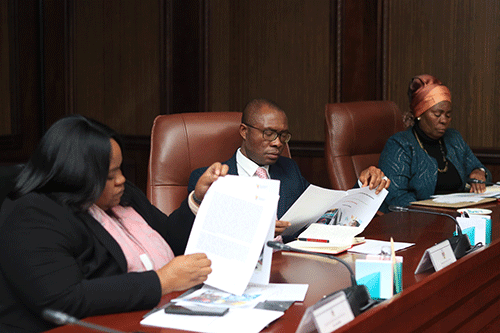President Hage Geingob yesterday instructed Cabinet to scrutinise and start much-needed discussions on the recently submitted Fourth Industrial Revolution (4IR) report.
Geingob was speaking during a Cabinet meeting where the 4IR task force presented the report.
“We will be left behind if we sit with folded arms. Let us go through the report and have discussions about the recommendations,” he said.
The eight-member task force was appointed by Geingob to assist government in harnessing opportunities presented through 4IR.
After yesterday’s presentation, chairperson of the task force, professor Anicia Peters, said it is necessary for ordinary Namibians to familiarise themselves with the report, as well as opportunities and risks that 4IR brings.
“It is sort of surprising and exciting that we find there are so many of the prerequisites we already have in place. An example is in innovation where individuals and businesses are already using digital technology. There are many things that we can celebrate,” said Peters.
She added one of the components that came out strongly was the unemployed youth who lack efficient opportunities for reskilling and upskilling to be able to find decent employment.
Peters observed that for Namibia to embrace this technological evolution, stakeholders need to rapidly come together and work concisely and delicately before reaping benefits: “For Namibia to position itself in the digital services, all the trade barriers the country is currently experiencing have to be lifted. This is where government comes in to create the infrastructure and conducive environment and incentives.”
The 4IR task force chairperson further advised Namibia should expand its productive capabilities from resource-based activities within the primary sector to the manufacturing and services sectors, to produce and export more complex and sophisticated products.
According to the 4IR presentation, there appears to be a skills mismatch between what is required within the various industries and the skills taught or acquired through the Namibian education system.
The report added the industry perceives the style of teaching in Namibia as not conducive to the 4IR, since it is predominantly based upon memorising and not sufficiently focused on creative and critical thinking. The report further emphasises the critical importance of investing in education if Namibia seeks to reap the benefits of the 4IR.
After yesterday’s presentation, education minister Anna Nghipondoka said digital transformation came out strongly from the just ended education conference. However, she noted the ministry has insufficient funds as about 80% of their budget goes to wages.
Meanwhile, the report further identified a number of shortcoming to benefit from 4IR, including lack of skills, especially advanced digital skills, lack of capital or funds for investment and lack of knowledge about possible applications of the evolving technology.
Additionally, identified issues raised included inadequate policy and legal framework in the country, cybersecurity as well as inadequate and incomplete national data.
The 4IR task force was required to, among others, conduct a country assessment to determine Namibia’s readiness for the 4IR and to make recommendations towards a coherent policy and legislative framework, to harness the full potential presented by the new emerging technologies.
Other recommendations contained in the report include improving access to the global trade environment by reducing barriers to e-commerce, developing robust e-government services and strengthening the 4IR research and development capabilities.
– mndjavera@nepc.com.na



